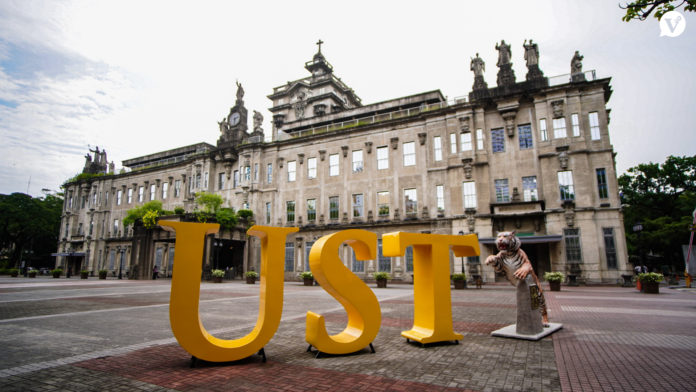UST slid to the 851-900 range in the 2025 edition of the Quacquarelli-Symonds (QS) World University Rankings, failing to sustain the previous year’s progress.
In the latest ranking released on June 5 (Philippine time), UST dropped from the 801-850 range, which it reached last year when it made its first leap in the QS World Rankings.
Despite its lower position globally, UST remained the fourth-ranked school in the Philippines.
UST secured the top spot among Philippine universities in the international faculty and international students criteria, though it scored lower in these indicators in the 2025 tally.
It received a score of 34.9 in the international faculty metric, down from 41.4 in 2024, and 5.8 in the international students ratio, down from 8.2 in 2024.
UST was the lowest-ranked Philippine school in terms of citations per faculty, assessed using data from Elsevier’s Scopus database. It scored 1.3 in this criterion, maintaining its position in the 701+ bracket globally.
Here is how the University performed in the other six QS indicators:
- academic reputation – 12.28 (from 11.5 in 2024);
- employer reputation – 39.9 (from 33.5);
- employment outcomes – 14.1 (from 12.5);
- faculty-student ratio – 12.5 (from 15.7);
- international research network – 18.1 (from 1); and
- sustainability – 2.4 (from 1.1).
Five Philippine universities were ranked in the 2025 edition of the QS World University Rankings.
The University of the Philippines remained the top school in the country, moving up to the 336th spot globally from 404th last year.
Ateneo de Manila University improved to the 516th spot from 563rd, while De La Salle University advanced to the 641-650 range from the 681-690 bracket.
University of San Carlos, which entered the QS rankings for the first time last year, fell to the 1,401+ bracket from the 1,201-1,400 range in the 2024 edition.
The Massachusetts Institute of Technology retained its position as the top-ranked university worldwide, a title it has held for 13 consecutive years.
The QS World University Rankings evaluated universities based on nine performance indicators: academic reputation (30 percent), citations per faculty (20 percent), employer reputation (15 percent), faculty-student ratio (10 percent), employment outcomes (5 percent), international faculty (5 percent), international research network (5 percent), international students (5 percent), and sustainability (5 percent).


















